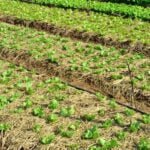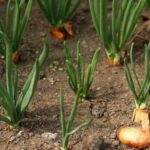Are you looking to enhance the health and productivity of your vegetable garden? One powerful solution to consider is using mushroom manure. Mushroom manure for vegetable gardens can provide numerous benefits, including improved soil health, better nutrient absorption, and increased crop yield. In this article, we will explore the composition and nutritional value of mushroom manure, how to choose the right type for your garden, the application process, and common misconceptions about its use.
Mushroom manure is a natural byproduct of the mushroom growing process that has become popular among gardeners for its ability to enrich and rejuvenate soil. By understanding the benefits of incorporating mushroom manure into your gardening practices, you can take your vegetable garden to new heights. Whether you are a beginner or experienced gardener, learning about this eco-friendly practice can help you achieve a thriving vegetable garden.
Throughout this article, we will delve into the various aspects of using mushroom manure for vegetable gardens. From debunking myths to providing expert advice and tips for successful gardening, this comprehensive guide aims to help you make informed decisions about incorporating mushroom manure into your sustainable gardening practices. So let’s explore how embracing the power of mushroom manure can lead to a bountiful and sustainable vegetable garden.
What Is Mushroom Manure
Mushroom manure, also known as mushroom compost, is a popular organic fertilizer that is highly beneficial for vegetable gardens. It is composed of a mixture of various organic materials such as straw, hay, corn cobs, and poultry or horse manure. These ingredients are used as substrate for growing mushrooms, and after the mushrooms are harvested, the remaining material is then composted to create mushroom manure.
One of the key benefits of using mushroom manure in vegetable gardens is its high nutritional value. This type of compost is rich in essential nutrients such as nitrogen, phosphorus, potassium, and other micronutrients that are vital for plant growth. The decomposition process also produces beneficial microorganisms that help improve soil structure and fertility.
When selecting mushroom manure for your vegetable garden, it’s important to consider the source and composition of the compost. Look for products from reputable suppliers that have been properly aged and cured to ensure that any harmful pathogens or weed seeds have been eliminated. Additionally, consider the pH levels of the compost and choose one that is suitable for the specific needs of your vegetable plants.
In summary, mushroom manure is a valuable addition to any vegetable garden due to its nutrient-rich composition and positive impact on soil health. When used correctly, it can significantly improve crop yield and overall plant vitality while promoting sustainable gardening practices.
| Benefits | Details |
|---|---|
| Nutritional Value | Rich in essential nutrients such as nitrogen, phosphorus, potassium |
| Soil Health | Improves soil structure and fertility through beneficial microorganisms |
| Crop Yield | Can significantly improve crop yield when used correctly |
Choosing the Right Mushroom Manure for Your Vegetable Garden
When it comes to choosing the right mushroom manure for your vegetable garden, there are several important factors to consider. One of the first things to take into account is the composition of the mushroom manure.
Different varieties of mushrooms can produce different types of manure, each with its own unique nutritional profile. It’s important to select a mushroom manure that is well-balanced and rich in essential nutrients such as nitrogen, phosphorus, and potassium, which are crucial for healthy plant growth.
Another factor to consider is the source of the mushroom manure. Organic mushroom manure is typically preferred for vegetable gardens, as it is free from synthetic chemicals and pesticides. Additionally, be sure to inquire about how the mushrooms were grown and cultivated, as this can impact the quality of the resulting manure. Look for mushroom manure that has been produced in a sustainable and environmentally-friendly manner.
The moisture content of the mushroom manure is also an important consideration. You’ll want to choose a product that has been properly dried and cured to ensure that it is free from harmful pathogens and weed seeds.
Excessively wet or fresh mushroom manure can lead to issues such as mold growth or nutrient imbalances in your soil. By taking these factors into consideration when choosing your mushroom manure, you can set your vegetable garden up for success and ensure optimal plant growth and yield.
By carefully considering factors such as composition, source, and moisture content when selecting your mushroom manure, you can provide your vegetable garden with the best possible growing environment. Choosing a high-quality mushroom manure will not only benefit your plants but also contribute to overall soil health and sustainability in your garden. With this mindful approach to selecting the right mushroom manure for your vegetable garden, you can look forward to bountiful harvests and thriving plants.
The Application Process
Mushroom manure is a valuable and nutrient-rich organic material that can greatly benefit your vegetable garden. When applying mushroom manure to your garden, it’s important to follow the proper steps to ensure optimal results.
First, it’s essential to prepare the soil before applying mushroom manure. This involves removing any weeds or debris from the garden bed and loosening the soil to promote better absorption of nutrients. Once the soil is prepared, you can begin the application process.
When using mushroom manure for vegetable gardens, it’s best to apply it as a top dressing. This means spreading a layer of the manure on top of the soil around your plants. Be sure to spread it evenly and avoid piling it up directly against plant stems, as this can cause them to rot.
After applying the mushroom manure, gently work it into the top few inches of soil using a rake or garden fork. This will help incorporate the nutrients into the soil and improve its overall structure. Remember to water the garden bed thoroughly after applying mushroom manure to help activate its beneficial properties.
Overall, following these steps will help you effectively use mushroom manure in your vegetable garden, promoting healthier plants and improved yields.
| Benefits | Details |
|---|---|
| Improved Soil Health | Mushroom manure enriches the soil with essential nutrients and improves its overall health and fertility. |
| Nutrient Absorption | The rich composition of mushroom manure enhances nutrient absorption by plants, leading to healthier growth. |
| Crop Yield | Using mushroom manure can result in higher crop yields due to improved soil quality and plant nutrition. |
Benefits of Using Mushroom Manure
Mushroom manure is a natural fertilizer that offers numerous benefits for vegetable gardens, including improved soil health, enhanced nutrient absorption, and increased crop yield. In this section, we will explore the positive impact of using mushroom manure and how it can contribute to the overall success of your garden.
Improved Soil Health
One of the key benefits of using mushroom manure in vegetable gardens is its ability to improve soil health. Mushroom manure contains a rich blend of organic matter, essential nutrients, and beneficial microorganisms that work together to enhance soil structure and fertility. By adding mushroom manure to your garden, you can promote better water retention, aeration, and drainage in the soil, creating an optimal environment for plant growth.
Nutrient Absorption
Another advantage of incorporating mushroom manure into your vegetable garden is its ability to enhance nutrient absorption by plants. The organic components found in mushroom manure release essential nutrients slowly over time, providing a steady supply of nourishment for vegetables. This results in healthier, more robust plants with improved resistance to pests and diseases.
Crop Yield
Using mushroom manure has been shown to significantly increase crop yield in vegetable gardens. The balanced combination of nutrients and organic matter found in mushroom manure supports vigorous plant growth and higher yields of fruits and vegetables. Additionally, the improved soil structure created by mushroom manure promotes strong root development, which further contributes to enhanced crop production.
Incorporating mushroom manure into your vegetable garden can lead to improved soil health, better nutrient absorption by plants, and increased crop yield. By understanding these benefits, you can make informed decisions about using mushroom manure as part of your gardening practices.
Common Misconceptions About Mushroom Manure in Vegetable Gardens
One common misconception about using mushroom manure for vegetable gardens is that it will result in a strong odor. However, this is not necessarily the case. Mushroom manure is typically well composted, which means that any strong odors have already dissipated during the decomposition process.
In fact, many gardeners find that mushroom manure has a mild and earthy aroma that is not offensive. It is important to source high-quality mushroom manure from reputable suppliers to ensure that it has been properly composted.
Another misconception is that mushroom manure will introduce harmful pathogens or diseases to the soil and crops. In reality, properly composted mushroom manure should be free from harmful pathogens and weed seeds.
The high temperatures reached during the composting process effectively kill off any harmful organisms, making mushroom manure safe to use in vegetable gardens. As with any type of organic matter added to the garden, it is essential to follow best practices for composting and handling to minimize the risk of contamination.
Some gardeners may also believe that using mushroom manure will lead to an imbalance in soil pH levels. However, when applied at the recommended rates, mushroom manure can actually help to improve soil structure and fertility without significantly affecting pH levels.
It contains valuable nutrients such as nitrogen, potassium, and phosphorus, which are essential for healthy plant growth. By incorporating mushroom manure into the soil, gardeners can provide their vegetable plants with a natural source of nutrition while also enhancing overall soil health.
By dispelling these misconceptions about mushroom manure for vegetable gardens, gardeners can confidently embrace this sustainable gardening practice and reap its many benefits without unnecessary concerns or fears. Through education and awareness, more growers can discover the valuable role that high-quality mushroom manure plays in promoting successful vegetable gardening endeavors.
Tips for Successful Vegetable Gardening With Mushroom Manure
When it comes to vegetable gardening, using mushroom manure can be a game changer. This organic material is rich in nutrients and can significantly improve the health and yield of your crops. In this section, we will explore some expert tips for successful vegetable gardening with mushroom manure, including best practices that can help you make the most of this natural fertilizer.
Opt for Composted Mushroom Manure
One of the most important tips for successful vegetable gardening with mushroom manure is to ensure that you are using composted manure. Composting helps break down the materials, making the nutrients more readily available to your plants. Be sure to choose well-rotted or composted mushroom manure for your garden, as fresh manure can be too strong and may burn your plants.
Use Mushroom Manure as a Soil Amendment
Instead of just sprinkling mushroom manure on top of your soil, consider mixing it into the soil before planting your vegetables. This will ensure that the nutrients are evenly distributed and easily accessible to the roots of your plants. Incorporating mushroom manure into the soil also helps improve its structure and water-retention capacity, leading to healthier and more productive crops.
Monitor Moisture Levels and Fertilizer Application
While mushroom manure provides valuable nutrients for your vegetable garden, it’s essential to monitor moisture levels and avoid over-fertilizing. Excessive moisture combined with too much fertilizer can cause nutrient leaching and potentially harm your plants. Make sure to water your garden appropriately and follow recommended guidelines for the application of mushroom manure to prevent any issues.
By following these tips and best practices, you can ensure that your vegetable garden thrives with the use of mushroom manure. With proper care and attention, you’ll soon reap the benefits of improved soil health, nutrient absorption, and increased crop yield in your garden.
Sustainable Gardening Practices
Mushroom manure is an eco-friendly and sustainable gardening practice that offers numerous benefits for vegetable gardens. By utilizing mushroom manure, gardeners can not only improve their soil health but also reduce the environmental impact of their gardening practices. Below are some of the key eco-friendly benefits of incorporating mushroom manure into your vegetable garden:
- Reduction of waste: Mushroom cultivation produces a significant amount of organic waste, which can be repurposed as nutrient-rich manure for vegetable gardens. By using mushroom manure, gardeners are diverting organic waste from landfills and contributing to a more sustainable environment.
- Minimal chemical use: Mushroom cultivation typically relies on natural and organic methods, resulting in minimal chemical usage compared to traditional farming practices. As a result, the mushroom manure produced is free from harmful synthetic chemicals, making it an environmentally friendly choice for vegetable gardens.
- Soil enrichment: Mushroom manure is renowned for its ability to enrich and improve soil quality, leading to better nutrient absorption by plants. By enhancing the fertility of the soil through natural means, gardeners can reduce their reliance on synthetic fertilizers, which can have a detrimental impact on the environment.
In addition to these environmental benefits, using mushroom manure in vegetable gardens promotes sustainable agriculture practices that align with principles of ecological balance and resource conservation. As more gardeners embrace eco-friendly solutions like mushroom manure, they contribute to a greener and healthier planet while reaping the rewards of bountiful harvests from their thriving vegetable gardens.
Conclusion
In conclusion, it is evident that mushroom manure can be a game-changer for vegetable gardens, offering numerous benefits for soil health, nutrient absorption, and crop yield. The composition and nutritional value of mushroom manure make it a valuable resource for gardeners looking to enhance their gardening practices. By understanding the factors to consider when choosing the right mushroom manure and following the best practices for its application, gardeners can maximize the potential of this organic fertilizer.
Furthermore, it is essential to debunk common misconceptions about mushroom manure in vegetable gardens and embrace the sustainable gardening practices it promotes. While some may have reservations about using mushroom manure, its eco-friendly benefits and positive impacts on soil fertility cannot be overlooked. With expert advice and tips for successful vegetable gardening with mushroom manure, both novice and experienced gardeners can achieve remarkable results in their plots.
Ultimately, integrating mushroom manure into vegetable gardens can lead to healthier plants, improved yields, and a more sustainable approach to gardening. As more gardeners recognize the power of mushroom manure as a natural fertilizer, we can expect to see an increase in thriving vegetable gardens that not only produce abundant harvests but also contribute to environmental conservation efforts. Embracing the potential of mushroom manure is key to creating a thriving vegetable garden for years to come.
Frequently Asked Questions
Which Vegetables Like Mushroom Compost?
Some vegetables that benefit from mushroom compost include cucumbers, peppers, lettuce, and spinach. The compost’s nutrient-rich content can help improve soil quality and promote healthy plant growth.
What Are the Disadvantages of Mushroom Compost?
One disadvantage of mushroom compost is its high salt content, which can be harmful to certain plants if not properly managed. Additionally, using contaminated mushroom compost can introduce diseases to the soil.
Is Mushroom Compost OK for Tomatoes?
Mushroom compost can be suitable for tomatoes, but it’s important to ensure that it has been properly pasteurized to eliminate any potential pathogens or harmful organisms. When used correctly, it can provide valuable nutrients for tomato plants.

If you’re looking to get into vegetable gardening, or are just looking for some tips on how to make your current garden better, then you’ve come to the right place! My name is Ethel and I have been gardening for years. In this blog, I’m going to share with you some of my best tips on how to create a successful vegetable garden.





